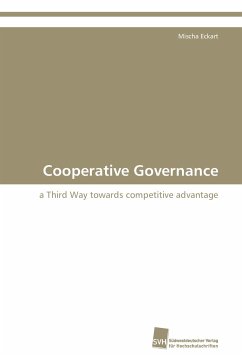The global financial crisis of 2008 has rekindled the flame of debate on corporate governance and how it can be organized to produce sustainable outcomes. Thereby, the academic and professional debate is dominated by mainstream topics such as executive pay and shareholder corporations. The current text explores the governance aspects of a different kind of organizational form called cooperative groups. A cooperative governance framework for Third Way governance is developed. Cooperative Governance is achieved by combining hard and soft skills. The author argues that mastering the hard skills of governance is essential, but it is the soft skills that carry the greatest potential for competitive differentiation. For example, as a hard skill, organizations must be able to set and execute a unified strategy. At the same time, the organization must learn how to enter into a meaningful bottom-up participation process with its stakeholders as a soft governance skill. Corporate executives are advised to embrace the soft aspects of governance that can be observed with cooperative groups as a means to achieve a competitive advantage.
Bitte wählen Sie Ihr Anliegen aus.
Rechnungen
Retourenschein anfordern
Bestellstatus
Storno








